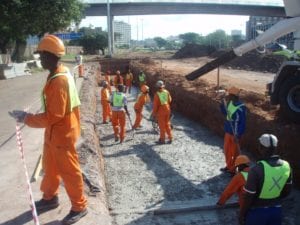The minister of Department of Labour, Mildred Olifant, may soon be able to determine levels of representation for the purposes of organisational rights for the vulnerable workers in sectors that are difficult to organise.
Olifant announced this action during a meeting in the North West – the last of a series of public briefings on proposed labour law amendments that saw officials of the Department of Labour (DOL) criss-crossing the country. Addressing a public briefing session that was attended by business, labour federations and other stakeholders, in Rustenburg, DOL chief director: collective bargaining, Thembinkosi Mkalipi, said the move was part of a drive to protect vulnerable workers. Mkalipi said this was a privilege that would be enjoyed by vulnerable workers – those who earn below R172 000 per annum. He said amendments to labour laws would make it possible to cover any workers not covered by other sector determinations or not covered by agreements entered into by statutory councils. He added that proposed amendments to the labour bills also make it easier for workers to join a union and unions to organise, as part of exercising organisational rights. The national public briefings were focused on the amendments to the Labour Relations Bills and the Basic Conditions of Employment Bills. The purpose of the public briefings by the DOL, which were being held nationally, was to report back and inform the public about changes made to labour law amendments. The bills are currently with parliament for consideration after having been accepted by cabinet.The two set of bills being amended seek to regulate the role of labour brokers and deal with casualisation in the labour market; the protection of vulnerable workers; enhancing the effectiveness of the labour market dispute resolution institutions such as the Labour Court, Commission for Conciliation Mediation and Arbitration (CCMA), the Essential Services Committee, the labour inspectorate and bargaining and statutory councils; and address current problems in industrial disputes and dispute resolution.
Mkalipi said as part of a drive to deal with violent strikes and disputes, the CCMA would now be expected to play a proactive role to intervene in the public interest. He said the balloting process that was done away with in 1995 was expected to make a comeback to deal with violence associated with strikes that do not enjoy mass support. The purpose of the public briefings by the DOL, which were being held nationally, was to report back and inform the public about the implication of changes made to labour laws.He said in summary the laws have struck a balance between diagonally opposed view points between labour and business. Photo: The minister of the Department of Labour, Mildred Olifant
Photo: The minister of the Department of Labour, Mildred Olifant







